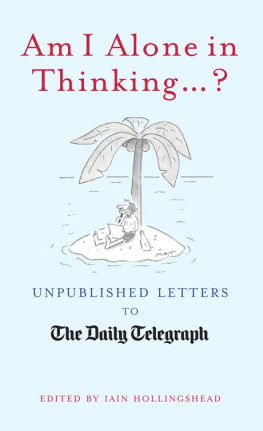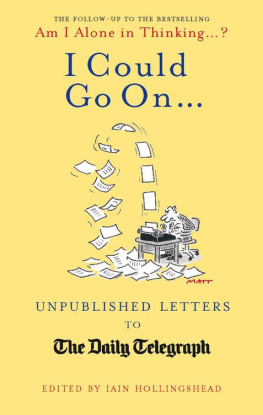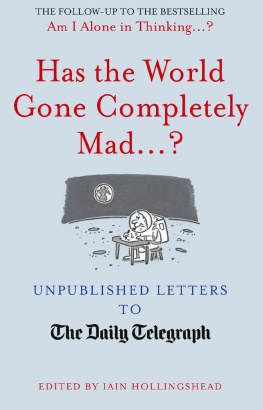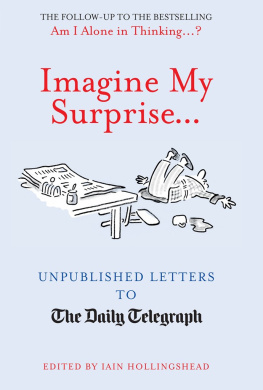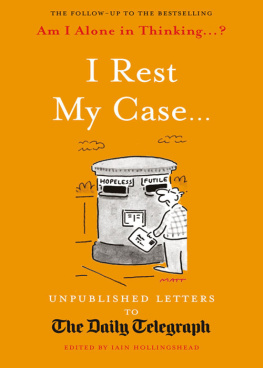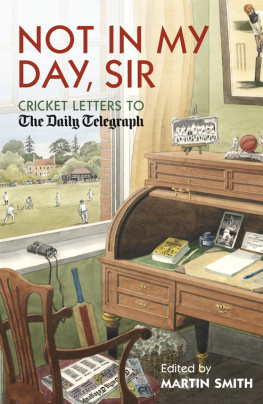When children grow up dreaming about becoming journalists if, indeed, children do still grow up with such dreams I doubt their fantasies include working on a Letters Desk. Surely journalism is about big scoops (duck houses spring to mind), hard-hitting interviews, in-depth features, foreign travel, free tickets to football matches it is not about sifting through green-ink-flecked correspondence from the aggrieved, the bored, the lonely, the pushy and the borderline insane (not that Telegraph readers fit these stereotypes, of course) in a desperate bid to cobble together a coherent Letters page.
Certainly, a life in letters appears to compare unfavourably at first glance with the glamorous existence of Carl Bernstein, Bob Woodward or even William Boot. At The Daily Telegraph, two people click through approximately 500 emails every day (they may be called Letters to the Editor; a more accurate title would be Emails to the Letters Editors) and choose, edit and collate around 20 to publish in the paper. On sunny days, when our traditional readership can be found enjoying their gardens (before returning indoors to send us an email about a rare type of goldfinch theyve spotted), the volume decreases noticeably. However, when the really important news stories break I refer, of course, to Carol Thatcher saying the word golliwog or John Sergeant leaving Strictly Come Dancing our inbox bursts to overflowing. During the MPs expenses scandal, the tally was touching 1,500 daily. Every single one is read and carefully considered, even if it repeats the same joke weve heard a dozen times before lunch.
On top of our electronic postbag, we receive around 100 faxes every day and a similar number of letters by post. One strange individual sends us a suspiciously squidgy jiffy bag at regular intervals. Although our long-suffering secretary, Dorothy Brown, has become an expert at spotting the postmark and confining the putrid package to the bin, wed be grateful if the Bristol resident in question could find somewhere else to relieve himself.
Yet despite these minor setbacks, The Daily Telegraphs Letters Desk, perhaps more than any of its rivals, is a truly wonderful place to work. The sheer volume of (non-organic) material we receive means that discovering the many gems from our diverse and intelligent readership makes it well worth sifting through some of the spoil.
Over the year Ive worked full-time on the desk, covering the maternity leave of Matilda McLean, the Deputy Letters Editor, weve published letters from the likes of Frederick Forsyth, the Archbishop of Canterbury, Colin Firth, Scarlett Johansson and, perhaps less gloriously, David Blunkett, whose regular streams of consciousness require more translation than most. But what really makes the page so special is that it belongs to the ordinary readers; it is a space where they can set the agenda, contributing unmatched expertise and insight from their own, very varied experiences. For example, every time theres an article in the paper about defence cuts, dozens of senior officers write the same day with their own contrasting views. Likewise teaching; policing; medicine; finance. Someone, somewhere, among our readership of more than two million will have an informed opinion. The page is a daily tribute to the wisdom of crowds, a judiciously edited form of citizen journalism at its best.
It is also a tribute to the generosity of our readers. Last December, we published a letter from someone who felt lonely at Christmas. Enough cards were sent to him via the Telegraph to fill all his windowsills and most of his walls. He wrote again in gratitude. In spring this year, a carer of a former Japanese Prisoner of War described his charges stoicism in facing an impoverished retirement. Several thousand pounds were subsequently sent in donations, enabling the carer to double-glaze all the PoWs windows to help keep out the cold.
The letters we publish can also offer a delightful change of tone amid the more serious Comment pages. Over the course of a couple of weeks in May this year, readers tracked the mass migration of a rabble of painted lady butterflies from the Isle of Wight to the north of Scotland. The correspondence was eventually put to rest by Damian Whitehead, writing from Gosport in Hampshire: During my naval career, I saw painted ladies in Bugis Street, Singapore. However, they were not butterflies and some of them were certainly not ladies.
Telegraph readers are a witty demographic. Some of the most enjoyable and long-running recent correspondences have been on such diverse topics as the perils of losing your spouse in a supermarket, the strange names we give to our houses and the correct way to eat marmalade at breakfast. As Valerie Shepherd from Sarisbury Green in Hampshire wrote: It was interesting to discover, while holidaying on a Turkish gulet last week, just how many times I referred to one of your readers letters to contribute to conversation round the table.
Hosting this ongoing international conversation, expertly deciding when to move it on or nudge it in a different direction, is Christopher Howse, the Letters Editor and one of the wisest, most interesting (and most bearded) people I have ever met. A reader has no more chance of sneaking a misquotation, a misplaced semi-colon or a hoary old chestnut past Christopher than Simon Heffer has of writing for the Guardian. Edit letters badly and they read like a mess of shouted, misshapen rants much like many of the comments below blogs. Edit them well and there is a sense of direction, debate even community.
Fortunately, I dont think I am alone in believing that our readers have created one of the finest if not the finest Letters pages in the world. When Tony Blair trumped Gordon Brown, again, by becoming the first world statesman to shake hands with President Obama, the former Prime Minister mentioned that he had read the Telegraphs famous letters page at the airport and had been reminded of his relative unpopularity in Britain (the letter in question spoke of Blairs lack of intelligence compared to Cheries). More prosaically, a fresh copy of our letters is hung daily above the urinals in a Westminster pub called St Stephens Tavern. They are also regularly spoofed in the fictional form of Sir Herbert Gussett in Private Eye.
It was during our month-long exposure of MPs expenses, which set the news agenda in Britain and made headlines around the world, that readers letters really came into their own. On the first day, we gave the entire page over to their views the first time that this had been done in the Telegraphs history. It stayed this way for the next fortnight as thousands of angry, erudite and witty ordinary people made their opinions felt. The Today programme regularly read out the best ones. Ian Hislop even quoted from the brilliant Telegraphs letters page on Have I Got News for You.
As the volume of letters increased, so necessarily did the ones we couldnt publish. Realising this, a couple of readers began to suggest that we publish a book of previously unpublished letters. Barrie Yellands enthusiasm for the idea prefaces this book. What a magnificent, humorous and salutary publication that would be, agreed Dr A.W. Taylor from Oldham in Lancashire. The wit it would contain would render it the only item required for many joyful years on an MP-free desert island.

